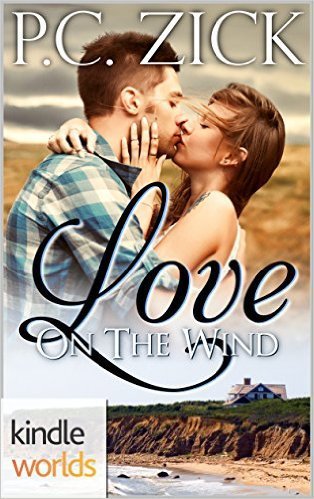P.C. Zick's Blog, page 15
July 18, 2016
JOIN THE FUN – RAFFLECOPTER FOR CHRISTMAS PETS & KISSES 2!
July 15, 2016
CHRISTMAS IN JULY – LOAD UP ON SOME SPECIAL #DEALS #JulyChristmas
 Click here to get some wonderful deals on eBooks July 15-17.
Click here to get some wonderful deals on eBooks July 15-17.
Minty’s Kiss is one of the featured deals offered for only 99 cents.

About Minty’s Kiss – When Molly retreats to North Carolina with Gracie, her ten-year-old daughter, she’s surprised to find her childhood crush, Nick, still living in the area. Months before her retreat, Molly’s husband announces he’s leaving to sail around the world with his best friend. She divorces him and takes Gracie and Harold, her seventeen-year-old cat, to the Smoky Mountains where she spent many happy childhood vacations. The morning after her arrival, Nick shows up on her porch, and he is even more handsome than she remembered. She feels the flush of her adolescent crush heating up. Minty’s Kiss is a sweet romantic novella, filled with holiday cheer brought to life by an adorable kitten.
Excerpt:
“Mommy, Harold isn’t here.”
Molly’s daughter Gracie jumped onto her bed, forcing her eyes open. It felt as if she’d only been sleeping for a few minutes. Molly sat up, rubbing her eyes.
“He’s probably hiding in a closet or under a bed.”
“No, he’s out in the woods somewhere. He ran outside when I opened the door to go out on the porch.”
Molly wondered how Harold managed to run anywhere these days, but he’d always been a bolter when a door opened. He loved being outside, particularly when he came to the mountains where he’d been born.
“He won’t go far. He’s too slow these days.”
“He wasn’t slow when he pushed past me and jumped off the porch.”
Molly got out of bed and pulled on her sweats that she’d peeled off the night before, dead tired after an eight-hour drive to the cabin from Jacksonville, Florida. Pulling a trailer behind her truck proved to be more challenging than she imagined. But they’d made it back to the place where Molly first fell in love and always felt safe. She inherited the cabin when her father died in May. When Molly’s husband announced a few months later that sailing the world with his best friend was more important than being a father to their daughter and a husband to her, the cabin provided Molly a lifeline. So she’d done what her own mother had done eighteen years earlier and moved her daughter and herself back to the cabin in North Carolina after her divorce. She vowed not to follow her mother’s example and kept her bitterness at Derek’s abandonment from Gracie. Besides, she loved Murphy, the mountains, and the small cabin that her father had neglected during his years of battling cancer. And more importantly, Molly made the decision to divorce Derek once she gazed into the huge gap in how each envisioned their relationship. Often on the drive from Jacksonville to Murphy, she wondered about Nick. She hadn’t seen him since she was a teenager, and he had girls his own age hanging all over him. He was probably married with two kids, so she put him out of her mind.
Molly walked out to the broad porch that ran the length of the cabin. She breathed in the mountain air and looked out at the fog masking the view of the Smokies. She’d always loved watching the “smoke” glide away in wisps of clouds, slowly revealing the tree-covered mountains.
“Harold, here kitty. Come on, Harold. Breakfast time.” She whistled her special call, which usually brought the old cat rambling in his walk of old age to find out what the fuss was.
“Hello, Molly.”
Molly turned sharply toward the driveway and watched as a tall man with blonde hair walked around the trailer she’d driven from Jacksonville. She knew instantly who it was, and immediately she felt safe. Nick Johnson. Her one-time best friend and childhood crush. The man she vowed to marry one day.
“Nick? Is it really you?” He took the four steps up to the porch in one giant leap and then he engulfed her in his arms.
“You’re all grown up, Molly, but I’d recognize you anywhere.”
“Same for you. It’s good to see you.”
“I heard about your dad. He was a good man.”
“Thank you. He was sick for a long time with cancer, so it was really a blessing when he passed.”
Nick nodded. “Did I hear you calling for Harold? You still have Harold?”
“Sure do. He’s an old man now, but he made the trip with us.”
“Us?”
Just then the front door opened, and Gracie came out onto the porch.
“Mommy, did he come back?”

Click on photo to be taken away for some special treats!


July 11, 2016
HAVE SOME FREE FUN IN JULY
 35 Romance Authors are offer 36 Books for FREE!
35 Romance Authors are offer 36 Books for FREE!Don’t miss this event running from Monday, July 11th through Thursday, July 14th.
Sign up for access to these FREE romance reads you’ll be downloading from Amazon.com!
https://madmimi.com/signups/199239/iframe


June 27, 2016
TRAVELS ON ROUTE 66
Put down the pen someone else gave you.
No one ever drafted a life worth living on borrowed ink.
Jack Kerouac
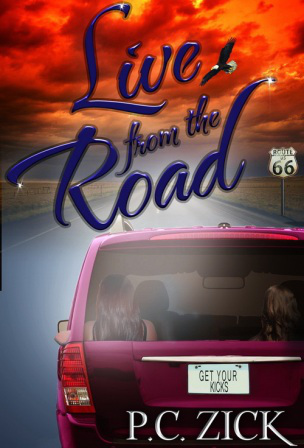
The Road Where Fiction and Reality Collide
By P.C. Zick (Originally appeared on Stacy Eaton’s blog Authors from Everywhere )
Jack Kerouac’s On the Road inspired me to take my own journey down the Mother Road in 2007. I knew I’d write something about the trip, but I wasn’t sure what it would be. I wrote some articles for the magazine where I worked at the time, but they were nonfiction travelogue pieces. They didn’t convey some of the hilarity and magic that happened when my friend and our two daughters hit Route 66, starting in Chicago and ending in L.A. nine years ago.
A year after the journey, I decided that fiction would be my vehicle for capturing the essence of the trip. I changed all the specifics, of course, but the spirit of that journey remained as I wrote Live from the Road, my tribute to Jack Kerouac and all road warriors who know the essence of any trip lies in the journey and not necessarily the destination.
The real story behind the novel Live from the Road began one night over a couple of beers at a local bar. It took more than a year to plan and pull off.
“You know what I’ve always wanted to do?” I asked my friend Joy one rainy night as we sat commiserating about our complacent lives. “I’ve always wanted to travel Route 66 from Chicago to L.A. But I’ve never found anyone who wanted to accompany me.”
“You’ve found her now,” Joy said, and thus began more than a year of plotting and planning our escape from our lives for more than two weeks on the road.
Romantic visions of Jack Kerouac and the open road, John Steinbeck and a dog named Charley, neon lights and roadside motels clouded our minds as the mundane details of the trip threatened to intrude on our starry-eyed dreams.
Our daughters, both in their twenties, asked if they could join us. We were astounded.
“Why would you want to spend your summer vacation with two middle-aged women?” I asked my daughter Anna.
“It’ll be a blast,” she said.
Joy’s daughter Hillary said something similar, and so we became a foursome of road warriors ready to set forth on one of the most historic roads in the world.
Simply saying “Route 66” conjures up visions of greasy hamburgers, neon signs flashing “No Vacancy,” characters out of a Sam Shepard play, and, of course, freedom to disappear into the gut of this country. Even though the trip occurred years ago, those visions still reverberate within my soul.
My journal became my companion on the trip, as well as emails sent to friends and family whenever we had the Internet. Serendipity and downright foolishness collided into one of the most memorable trips of my life.
Soon after the trip, I began writing the fictional version using the seeds of events from the journey. All I had to do was take a small event from the real trip and amplify it into a golden nugget of a story. Amazingly, there were many stories that never came close to appearing in the book because they were just too outlandish. Those stories remain sacred, only to be pulled out when the four of us reunite to reminisce.
Live from the Road—my fourth novel—became the first book I published as an Indie Author in 2012. My other books had been published traditionally. I even had an agent for a bit before becoming disillusioned with the world of publishing. This road trip novel also marked my return to writing in a very different world from the one I’d known. Since its publication, I’ve written nine more novels, with four more simmering on the back burner in my mind.
The characters from Live from the Road always repeat one ridiculous axiom throughout the story: “Always head in the direction we’re going.”
That’s exactly what I continue to do every day as a writer. The world of writing and publishing is undergoing a revolution right now, and I’m happy to be a part of it. As I head in the direction I’m going, I’m writing and loving every minute of the trip.
May all your journeys be fruitful. And if you need to be reminded of the importance of enjoying the ride on the way to your journey, give Live from the Road a read. If nothing else, you laugh at the antics.
Excerpt from Live from the Road
Chapter 1 – Lake Michigan to the Pacific
Route 66 – just the name conjures up visions of flashing neon motel signs, convertibles filled with carefree travelers, Jack Kerouac-like adventures, and John Steinbeck writing odes to a dog. Route 66 connotes movement toward unparalleled scenery, unexpected miracles, and dreams come true.
My best friend Sally and I heaped all those expectations on our own personal journey down Route 66 – the road Steinbeck dubbed the “Mother Road.” I’m sure the author never envisioned “mothers” such as us hitting the road to discover our own meanings of life. When our grown daughters decided they wanted to join us on our journey, we welcomed them aboard. From the beginning, I heaped plenty of expectations on that glory road. I’d been numb for five years, and I suspected my daughter lived in the same limbo. With Sally and her daughter, Ramona, as our companions, I hoped CC and I would be able to peer into the abyss of our sadness created when my son Sean died five years earlier. Whatever happened, I knew with a certainty my life would change during and after this trip. I never predicted it would turn all four lives upside down. It’s probably not surprising – the path Route 66 followed carried many lost and broken souls from the displaced Native Americans on the Trail of Tears to the Dust Bowl victims of the 1930s. Even Jack Kerouac faced his share of demons while traveling the Mother Road.
The road’s original goal – to link Lake Michigan to the Pacific Ocean 2,400 miles away – still remains, even though most of the original road does not. The four of us raced toward the charm of Route 66. We yearned to discover its magic as the glory road leading to salvation and the Shangri-La of America – California. We found the road paved, not in gold, but in broken pieces of asphalt and towns killed by the interstate. But amid the actual reality of the road, we found moments of inspiration and serendipity.
After months of planning, we flew from our homes in Florida to Chicago in early June 2007. When we landed at O’Hare Airport, I looked at my daughter CC with her backpack and sleeping bag on her back, torn black T-shirt advertising Eraserhead, dyed-red and spiked hair, and I knew the years had sped by faster than I ever knew possible. Recently divorced from her father, I was beginning a new era in my life as a 50-year-old single woman. I stared at CC, attempting to put it all together in my mind. Even though I didn’t look it, I felt as if I was the same age as my 25-year-old daughter waiting for her luggage to appear on the carousel. Was this really the baby I nestled at my breast all those years ago?
“Mom, watch out,” CC said as I almost backed into a stroller being pushed by a toddler. I looked down into the face of a tiny baby sleeping peacefully as the older sibling attempted to maneuver around the people waiting for the bags.
“I’m sorry,” I said to the mother walking behind the stroller and watching both her children carefully. “I wasn’t paying attention.”
“That’s all right,” she said. “I really shouldn’t let her do it, but she insists on doing everything herself.”
“Really? I wonder what it would be like to have a child like that,” I said as I pointed my thumb at CC. “This one has always done exactly what I have said.” I rolled my eyes.
The mother smiled at me, and then took in CC’s hair and torn shirt. She quickly looked down at her own daughter and then at the baby sleeping in the stroller.
“Enjoy them now,” I said. “They grow up so fast you won’t believe it, and then they’re gone.”
I turned away quickly so she wouldn’t notice the sudden tears forming. The words slipped out of my mouth without thinking much about them. Only when I heard them out loud did I realize what I’d said. CC was right next to me, but her brother Sean was not and never would be there again. I wanted to chase after that mother and tell her not only to enjoy, but also to hold onto them for as long as she could. It could be over in the time it took to tie their shoes.
“You okay, Mom?” CC asked. She was looking at me intently.
“Fine, fine. I was just remembering you and Sean at that age. It’s over so quickly.” I was fighting to keep control there in the middle of the airport.
“This trip is going to be good for all of us,” she said.
She gave me a quick hug, unusual for my daughter who usually abhorred physical displays of emotion. Luckily one of our bags appeared right then, and the moment passed.
Sally and her daughter Ramona stood on the other side of the carousal. I saw Sally’s bag with the pink ribbons on the handle go by. It was a gorilla of a suitcase – very hard to miss. Sally said she’d rather have one large suitcase rather than the smaller two or three bags the rest of us carried. Problem was she couldn’t get it off the carousal, so Ramona was left to recover it while her two bags passed by unnoticed. Thank goodness the gorilla had wheels.
Once we picked up our rental, a red mini-van, we loaded all of our belongings in the back. CC was the packer in the crew, and she told Sally that her bag would always have to go in first because it was too big to go on top of any of the other bags.
Sally took the driver’s seat – she always drove, and I never argued. It was her way of maintaining control. I took shotgun with the maps and directions and Route 66 books. It actually worked out better this way. I liked giving directions as much as Sally liked driving the engine. Ramona would be our tour guide as she read from the Route 66 books we’d been collecting over the past year of planning for this adventure.
“First stop is Wal-Mart for a cooler and two tents,” Sally announced. “Everyone keep your eyes peeled for a good exit.”
After settling in our hotel, we decided we would walk toward Lake Michigan and find a place for dinner and whatever else might grab our attention.
The full moon directed us downtown. We crossed over the Chicago River, reveling in Chicago’s architecture. Some dubbed it the capital of architecture and the birthplace of the skyscraper. Studs Terkel called it a “city of men.” And as I looked up at the dizzying heights of the buildings surrounding us, I could see why. We stopped often for pictures, asking people we passed on the sidewalk to snap a shot or two.
We didn’t know where we were headed until Ramona spotted a banner waving in the breeze over a balcony railing, advertising “Rooftop Dining.”
“That looks like the perfect place,” Ramona said as she pointed to the sign. “It’s even got a view of the Sears Tower.”
A small elevator meant for two people opened up in the lobby.
“Come on, Mom,” Ramona said when Sally hesitated to crowd into the small cubicle. “It’s just a short ride to the rooftop.”
“All right, but I’m finding stairs for the trip down,” Sally said.
Sally hated small confined places, but we crowded around her and exchanged one-liners until we spewed out to the rooftop, where a waiter stood ready for the energy of four females set loose on the road for several weeks of freedom. Freedom is just another word for doing whatever we pleased.
“I’d like to hear some blues or jazz tonight,” I told Sally as we waited to be seated. The full moon began its ascent over Chicago’s skyscrapers, providing a soft glow over our already glowing faces. “Johnny and I came here twice, but he never liked going to clubs.”
“Then we’ll do it tonight,” Sally said. “Anything is possible.”
“Do you really believe that?” I asked. Sally’s perpetual optimism never failed to amaze me.
“I have no choice but to believe it,” Sally said. “It’s the only way I can get up every morning and remain positive.”
The waiter, young, handsome and very Jamaican, was actually the bartender, but he had to fill in for the usual Friday night waitress.
“She had quite a hangover from last night,” he said. “So I’m going to sit you beautiful ladies right here where you’ll notice there’s an extra chair just for me.”
“I don’t believe it!” Sally said. “They have hot dogs on the menu.”
“Mom, you’re not going to order a hot dog on our one night in Chicago,” Ramona said.
“I most certainly am,” Sally said. “And I’d like us all to make a pact. No criticizing each other for just being ourselves.”
Ramona shrugged and CC rolled her eyes, but eventually both of them agreed. Then they all looked at me.
“It’s a part of my personality to make fun,” I said. “Does that count as criticizing?”
“You know what I mean,” Sally said. “If I want to eat five hot dogs for dinner no one is allowed to say anything.”
“What if it gives you gas and makes the rest of us sick? Can we say something to you then?” I asked.
Now it was Sally’s turn to roll her eyes. She ordered the hot dog with everything except sauerkraut.
“Does that mean I can’t tease you about all the hand lotion you put on your hands?” CC asked me.
“I have no idea what you mean,” I said as I reached around to my purse hanging from my chair to see if I had a bottle of Aveeno ready to apply when I was alone.
Our substitute waiter messed up the drink orders, but he was so cute and funny we forgave him. We ended up with an extra drink or two, mixing our red wines with the whites. Two margaritas, one with salt and the other without, magically appeared when no one had even ordered a margarita. It was that kind of night. The margarita glasses soon stood empty on a table overflowing with dirty dishes and empty glasses.
“So where can we hear some live music tonight?” Sally asked our bartender-turned-waiter. “We have a need of the blues.”
“You ladies couldn’t be blue if you held your breath for two days,” our fantasy man said. Even I laughed at that corny line.
He told us to head down to Buddy Guy’s Legends. Buddy Guy – the bluesman who inspired Jimi Hendrix and Eric Clapton – had a club on Wabash a few blocks away.
“Buddy sometimes sits in on a set or two, but no one knows when,” our waiter/bartender said. “He even comes here for dinner once in awhile.”
We didn’t care if Buddy was in the house or not; we just wanted to hear music live in Chicago. Sally and I headed to the bathrooms on the top floor while CC and Ramona raced down the four flights of stairs to the lobby.
All the toilets in the bathroom were close to overflowing. I chose the least full one which meant there was an inch from the water level to the top of the toilet. After I finished, I attempted to flush, and so did four other women who had come in behind us. The water in the bowl gurgled but didn’t go down. I shrugged my shoulders and left the stall. As Sally and I stood at the sink washing our hands, water began seeping out of all five stalls.
“Quick, let’s get out of here,” I said, not bothering to dry my hands so we could beat the other women to the small elevator.
I pulled Sally’s arm, and we ran. We jumped in the small box before Sally could change her mind.
As the door began closing, a hand reached out and shoved the door open. A small black man wearing a beret and a Hawaiian shirt entered the elevator behind us.
Sally grabbed her mouth and began gagging.
“Something the matter?” the man asked as the doors shut on the three of us now crammed together in the small space.
“We just had a trauma in the bathroom, and she’s claustrophobic,” I said.
“This place is notorious for overflowing toilets, and this elevator is more like a moving shoe box. Where are you two lovely ladies headed tonight?” he asked.
“We’re going to a club,” I said. Sally stood mute with her hand still firmly clasped over her mouth. “Some place down on Wabash.”
The elevator made a rumbling sound, and then jerked to a stop. Nothing happened for a few seconds. Sally moaned next to me.
“Now isn’t that something? I happen to own a place down on Wabash. Place called Legends. Ever heard of it?”
“That’s where we’re going!” I said. “Then you must be Buddy Guy.” I held out my hand, but Sally did not because she now had both hands over her mouth.
“The one and the same.” He clasped my hand then pulled me close for a hug as the doors opened onto the lobby where Ramona and CC stood waiting.
Buddy Guy continued holding me as Sally hurled chunks of undigested hot dog across the small lobby. CC and Ramona jumped out of the line of fire just in time.
“Been a long time since I had that effect on a woman,” Buddy said as Sally gasped for air and fell out of the elevator.
“Been a long time since I’ve done that,” Sally said as she reached for Kleenex in her purse. “I’m so sorry. Did I get it on anyone?”
“No, Mom, you hurled a pretty clean shot out the door,” Ramona said. “Not badly done either.”
“Route 66 here we come. This trip is off to a rip-roaring start,” I said as we headed out into the night with Buddy Guy as our very own personal escort. “I hope the old road can withstand the onslaught.”
“I’m sure you ladies will do it justice in the best tradition of road warriors everywhere,” Buddy said.
“On the road again, just can’t wait to get on the road again,” CC sang. “The life I love is making music with my friends. And I can’t wait to get on the road again.”
“You can really sing,” Buddy said. “You in a band?”
“Not really,” CC said. “Just fool around sometimes.”
“Let’s get you fooling around some tonight then,” he said.
The moon, large and orange, illuminated us in soft natural light as the lights of downtown led the way. The city of men merged with nature as we marched toward Lake Michigan.
“Ever notice how when the moon is larger, it’s actually smaller,” Sally announced.
Somehow, it made perfect sense on a night when sense had nothing to do with anything at all.

Available on Kindle for only $0.99 this summer


June 16, 2016
EY WADE RELEASES TWO BOOKS #NEWRELEASE
 I love helping my fellow authors celebrate their new releases, so today I’m happy to announce that Ey Wade released two novels this month. Both of them could be classified as political intrigue with a touch of romance. Or perhaps a bit more than a touch of romance. Judge for yourself with these excerpts!
I love helping my fellow authors celebrate their new releases, so today I’m happy to announce that Ey Wade released two novels this month. Both of them could be classified as political intrigue with a touch of romance. Or perhaps a bit more than a touch of romance. Judge for yourself with these excerpts!
 Ribbons & Belle
Ribbons & Belle Gorgeous, dedicated fertility counselor Tyson Ribbons, has admired and loved embryologist, Anabelle “Belle” Lee for a long time. When she comes in for counseling he fights everything within him not to deter her from her plans.
Doesn’t stop his heart from wishing it could be him fulfilling her desire.
Anabelle Lee, mourning her inability to have a child of her own, suffered through two miscarriages, a heartbreaking late-term abortion, and a soul-crushing divorce. As an embryologist, she has protected the potential life of many frozen specimens and lived envious of the women choosing InVitro fertilization as their form of reproduction.
After a bit of encouragement from her best friend, and counseling from the very perfect Dr. Ribbons, Anabelle takes steps to fulfill her desire to become a mother.
Problem is, the announcement brings more of a shock than a gift.
Excerpt from Ribbons & Belle
Anabelle Lee carefully slotted the test tubes into their assigned spots. The gray matter rising from the liquid nitrogen in the vacuum lined tanks, gave her the urge to cough, but she dared not. Any amount of germs had the potential of contamination and death to the minute life forms. At least, that’s how she felt.
Closing the lid to the container, she pushed the required buttons, locked the precious vials and lowered them to safety. With one last look over her shoulder before leaving the room, Anabelle sighed and closed the door. She hadn’t realized she was crying until her friend and fellow embryologists, slid a wad of Kleenex into her hands.
“Belle, why do you do this to yourself? I just don’t understand. No one coming in here deserves a child more than you. You know all of the risks, you see the donor lists and can have your pick. Call your gyne for counseling and set yourself up for In Vitro or artificial insemination.”
“I want to, but I don’t want to be disappointed. I’m not sure I’m ready for another heartache.”
“I can understand your feelings after everything you’ve been through and that sorry-assed husband of yours leaving right after you lost the baby. He didn’t even hang around long enough to see her buried. But that was three years ago. He’s moved on with life, married someone else and has a baby of his own. You deserve that same kind of happiness.
Go out, pick you a live body and either get you some and have you a baby or count up your pennies and splurge on a test tube. Here,” Sunny riffled through the pockets of her scrubs, pulling out hands full of change and paraphernalia, sorting through to put the coins on the desk and push in Belle’s direction.“Here’re seventy-five cents, to start the fund.”
Belle choked and giggled at the same time, which ended up sounding like an animal being tortured and caused her to end up wobbling in her chair and banging against the desk from laughter.
“God, you’re so crass, Sunny. You make it sound as if I’m walking into the cosmetic aisle of any mass market store and picking out a tube of lipstick.”
“Well, having the right tube is just as important as having the perfect shade of color on your lips. You know, that batch you just locked into that frozen pits of a tundra, does have one of the best specimens. Or you can simply pluck him from his office, drug him, take him home, and tuck him into your bed. Not to sleep of course. The two…”
“Stop, that’s just a stupid rumor, I’m sure. Something to keep the nurses speculating. Anyway, we practically work together. I can’t use him like that.” Annabelle straightened herself under the desk and began ticking the keys of the computer. “Besides, who says he would go anywhere with me?”
June 15, 2016
WRITING AWAY THE GRIEF
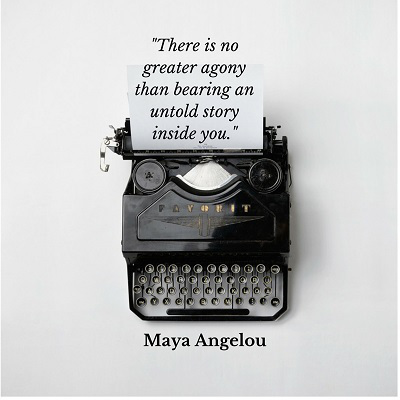 Writing serves as my salve for grief. And today, I write to overcome the sadness threatening to envelop me.
Writing serves as my salve for grief. And today, I write to overcome the sadness threatening to envelop me.
The mass shooting in Orlando hit me hard. Maybe because I lived near Orlando for thirty years. Maybe because the death of so many in one place horrified me. Maybe because someone with mental health issues purchased an assault weapon days before. Maybe because hatred could be so strong toward people of a particular race, religion, or sexual orientation that it caused so many people to die–people who were simply enjoying a good time together.
Maybe all of the above made me cry for two days afterward anytime I saw media coverage. My heart is heavy and my prayers are for all the victims, survivors, and their loved ones.
Years ago, during the first wave of the AIDs epidemic in this country, I watched as friends and relatives ran away the gay community. Sons and daughters were left to die alone from a disease that had yet to find drugs to fight it. It happened in my own family. My uncle and aunt refused to go to their son’s bedside or to even attend his funeral all because they couldn’t accept him and his choices. His story haunted me for years until I decided to put it all together in a fictional format, in hopes of showing others how incredibly fruitless it is to shun our loved ones.
The story involves my cousin, who did everything he could to prove to himself and his parents that he wasn’t homosexual. He married twice, but both marriages ended after only a couple of years, the first one worse than the second. The first wife took their son away and had my cousin sign away his rights of parenthood.
But then, my handsome charismatic cousin continued on his path to please his parents who measured success by who you knew and how much you made. Soon after the divorce, he began dating a beauty pageant queen from Wisconsin. When his then-girlfriend, Terry Anne Meeuwsen, was crowned Miss America in 1973, my aunt and uncle were beside themselves with pride for their only child. The pride continued to the Christmas wedding. My parents didn’t attend because they couldn’t afford the proper clothes for the event.
I found an article today in the Ocala Star Banner, giving a nod to the pride they felt. Click here to see.
However, the fairy tale wedding didn’t last very long, and he moved to California. Stories of his lymph node cancer drifted to me only after I would inquire about Tom’s well being. They didn’t go to his side, and it didn’t take a genius to know why and to understand what the euphemism “lymphoma” meant.
“He’s recovering now,” my aunt told me one day, as my uncle remained silent. It was their way of telling me they didn’t want to discuss him . Within a few months they had an update.
My cousin had died in California. His partner called asking my aunt and uncle to attend the memorial service. They refused despite their ability to very well afford a trip from Florida to California. The partner sent them a poem about Tom. I never saw it until after my uncle died, and my aunt presented it to me. She asked me to take it and keep it safe. She couldn’t look at it, but she didn’t want it destroyed either.
As an author, I eventually wrote about my cousin in my second novel, A Lethal Legacy. It was with the writing of this novel that I finally understood what writers meant when they said, “being in the flow” of a piece of writing. As I wrote the death scene, I closed my eyes and tears streamed down my face. My fingers flew across the keyboard without my knowledge. I was lost in the writing. Twenty years later, I still seek those moments of the “flow.”
Here’s the scene from A Lethal Legacy that gave me the first glimpse into the healing effect writing has on my soul. Today, I continue that legacy.
I slowly rose from my bed to get dressed. I would not let Gary die alone like my father. He would have those who loved him the most near him as we tried to make his passage from this world a safe one. After a lifetime of suffering, it was the least he deserved.
“Where’s Claire?” I asked Rick when I passed him in the hallway on my way to Gary’s room.
“Sitting by his bed. She won’t leave him now. His breathing has already started to change. There’s a rattle,” he said.
“Let’s go. From now on, we should always stay there with Claire, I think.”
“I agree,” Rick said.
We remained with Gary for the rest of the night. It was excruciating to sit in that room. We waited after each loud breath for the next one, dreading it, yet hoping it would come. As the night wore on, the breathing became more irregular.
Finally, around dawn with the new day emerging outside the shaded window of the bedroom, Gary took one last gasp of air, but he never let it out. He had gone from us, just as the night had slipped away, with little fanfare.
The first cry came from Rick who began rocking back and forth in his chair next to the bed. Claire had positioned herself on the other side standing near the head of the bed resting her cheek on Gary’s forehead as he breathed for the last time. The tears slid down her face as I went to stand next to her, trying not to let the sob escape from my throat. We stood motionless for an eternity each thinking our private thoughts of the man who could finally rest in peace in a place where demons no longer tortured young men, where fathers cared, and where acceptance came as naturally as living on this earth.
June 15 and 16 – A Lethal Legacy may be downloaded for free on Amazon by clicking here.


June 6, 2016
ROMANTIC PICKS #BEACHREAD #CONTEMPORARYROMANCE Love On The Wind by P.C. Zick
Just saw this post on Romantic Picks! Love it.
Six years of traveling for her television series has left host Kiley Nelson longing for a place to call her own. Spending a weekend at her girlfriend’s beach house is the perfect reprieve, especially when she purchases property to finally settle down. But her peaceful escape is shaken when she smashes into a car containing the sinfully sexy and infuriated passenger, Jeff Hammond, who immediately melts her heart.
Jeff, staying at his friend’s Montauk home to relax after a trying week of building a home for a spoiled diva, doesn’t count on sharing his weekend with the flaky, yet incredibly sexy, Kiley. He agrees to build her house, despite the tug on his heart as Kiley turns him on in every delicious way.
Passionate weekends and shared dreams begin to shape the house they start to build together. As their relationship deepens, so do the wounds from past hurts, rousing…
View original post 33 more words


May 30, 2016
Decoration Day, which we’ve come to call Memorial Day, b...
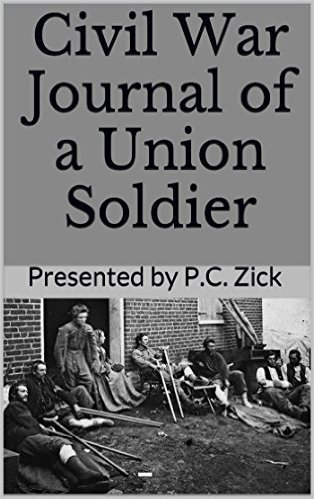
Decoration Day, which we’ve come to call Memorial Day, began in 1866 as a way to honor those who fought and died in the Civil War (1861-1865). Until 1971, it was celebrated on May 30. Now we celebrate it on the last Monday of May, usually as a way to start the summer season rather than a way of honoring our fallen soldiers. This year the official Memorial Day falls on the original date of May 30.
When I was young, growing up in a small Michigan town, the day began solemnly with the high school band leading a parade from the high school to the cemetery where a 21-gun salute honored all of our fellow citizens who fought in all the wars since the Civil War. The veterans handed out paper poppies which symbolized the original Decoration Days when women would decorate the graves of soldiers with flowers. Then we marched back to the high school where another civic group handed out ice cream bars, and that’s when the official partying began with backyard barbecues and frisbee tossing. By starting the day at the cemetery, we all knew what we were celebrating.
This weekend, I’m celebrating the holiday with a remembrance of my great grandfather who fought in the war as a Union soldier and rendered his account of the horrors of fighting against fellow countrymen in his journal that I published in 2013. The book is available in paperback and audible formats, as well as Kindle. This week, May 28-June 4, the book may be downloaded for only $0.99 on Amazon.
Here’s an excerpt from the journal of Harmon Camburn who I’m proud to call my great grandfather. In this particular section, he details his company’s actions during the Battle of Fair Oaks.
The Battle of Fair Oaks (AKA Seven Pines – May 31-June 1, 1862
May 31 – Orders came for us to report to General Kearney at Seven Pines Tavern. Without delay, we were on the move. Before we reached the stage road, one of those sudden storms peculiar to the south burst upon us without warning. The sky grew dark. Then quickly came sheets of livid flame, followed by deafening crashes of thunder. In another moment, sluices of water began to pour. Darkness became so intense that nothing could be seen except by the blinding, hissing, crackling flashes of lightning. The scene was one of terrific grandeur, but exposed to its fury as we were, it was not pleasant. Some gained the partial shelter of the trees. Others could not make head against the flood and were forced to stand and take it where they were. In half an hour, this cloudburst was a thing of the past. The only evidence that it had been was the distant detonation of thunder and the lake of muddy water in which we stood over our shoe tops.
As soon as the storm swept by, we marched away in pursuit of orders. Then there broke upon our ears rapid explosions of thunder that we knew too well were not from heaven, followed by an unsteady roll that we knew was not the reverberation of thunder along the clouds. To our experienced ears, it was the sound of deadly strife.
Then came fugitives from the front, saying that Casey’s division which was in the advance had been surprised at Fair Oaks station and “All cut to pieces.” As with increased pace and quickened pulse we pushed forward, the number of fugitives increased and all had the same cry. “We’re all cut to pieces.” To say that our little band felt no misgivings in the face of this wild rout would not be true. Thoughts of Bull Run forced themselves upon us, but when did the 2nd Michigan fail to report wherever they were ordered. Straining toward the front, we met the lion-hearted, firm and true General Heintzelman at a point where the swamp and creek came close together within forty rods. This hair-lipped old general demanded, “What are these and where are you going?” Being told that we were two companies of the 2nd Michigan going to report to General Kearney, he ordered, “Deploy across this muck and stop these stragglers or kill them.” Instantly, the movement was begun at double quick and in another moment, we were facing the mob of excited, terrified men, some hatless, from they knew not what, while the spent balls from the enemy was stimulating their speed.
To stay this tide was to us a harder task than to fight the enemy. They were our friends, and we did not want to hurt them. By the sounds from the front, we knew that our men who had not been stampeded were bravely holding the rebels in check. These men must be made to turn and help them. At first, it required rough treatment and some received wounds here that had escaped unscathed at the front, but when the tide was once stayed, a peremptory order to “Fall in,” enforced by the point of the bayonet, backed by a loaded musket was obeyed without resistance. Each had his story to tell, to which we would not listen. Officers and men alike insisted that “We’re all cut to pieces” and “I am the only man left of my regiment.”
Officers and men resorted to various subterfuges and tricks to get past our line. Two men carrying their brave and esteemed captain, with both legs tied up with handkerchiefs, were stopped to examine the captain’s wounds. When the bandages were removed, no wounds were to be found. Men with heads, bodies, legs, and arms tied up were detected in the cheat and put into the ranks. A colonel of a New York regiment with two men carrying him desired to push through. We sent the men to the ranks, but passed the colonel. He was dead-drunk. We dumped his carcass on the ground in the swamp as of no use. One by one, seven color bearers drifted back to us with their colors and the declaration that they alone had escaped with the colors, the others were “all cut to pieces.” The phrase “cut to pieces” became a joke and many an officer in splendid uniform was asked to take off his clothes and show where he was cut. Some officers were indignant that their rank was not respected, and that private soldiers dared to prevent their passing, but a look into the muzzle of a loaded musket with a resolute eye behind it inclined them to waive their rights for this once. By stationing the various regimental colors in different parts of the field, and directing the men to assemble around their own colors, we rallied seven good-sized regiments of live men that were not “cut to pieces.” We kept our line all night, part of the men sleeping at a time. Our duty had been a very unpleasant one, but we were assured that it was very important.
June 1 – Early in the morning we joined our regiment on the battlefield. Seven companies of the regiment were in the thickest of the fight and lost heavily in killed and wounded, and Colonel Poe had his horse shot under him. Richardson’s division was already pushing the enemy, and long before noon, the lost ground was regained. This two-day battle was called by both names – Fair Oaks and Seven Pines, the fighting being done between a railroad station of the former name and a country tavern of the latter. (The aggregate loss to Union and Confederate – killed 3,690, wounded 7,524, prisoners 2,322.)
[Fair Oaks or Seven Pines, May 31-June 1, 1862, with the total killed, wounded, or captured now recorded as 13,736.]
Purchase Links for Civil War Journal of a Union Soldier


May 18, 2016
#NEW RELEASE – A SHORT STORY ANTHOLOGY
 Unshod – An anthology of traditional and contemporary western short stories where raw emotions and heartbreaking experiences written by nine female authors will captivate all reading tastes.
Unshod – An anthology of traditional and contemporary western short stories where raw emotions and heartbreaking experiences written by nine female authors will captivate all reading tastes.
It gives me great pleasure to announce the release of this anthology, and it’s a great honor to have my short story “March Forth” placed in the same set with some very talented authors.
From Jan Morrill, Pamela Foster, Staci Troilo, Joan Hall, P.C. Zick, Janna Hill, Michele Jones, Francis Guenette, and Lorna Faith, here’s a peek at what’s in store:
Feel the pain of a young Japanese girl who comes home from an internment camp after World War II and learns it’s easier to go with the flow than to fight the current.
Struggle with an expectant mother on the cold winter prairie while she waits for her husband to come home from a hunting trip.
Journey with a young woman to the Four Corners as she tries to connect with her Navajo ancestors.
Try not to believe in the superstition of the blue moon—if one dies, three more will follow.
Know that one way or another, life will change inalterably that day.
Walk in the footsteps of an old cowpoke who thought he made the deal of a lifetime.
Suffer the torments of a young lady who wants desperately to marry but seems destined never to wed.
Walk the wild western paths and run from unimaginable dangers.
Choose between an unhappy life of luxury or a happy life of simplicity.
Nine female authors pen western tales that you’ll want to retell around a campfire. These aren’t your granddaddy’s westerns. They’re the next generation’s, and they’re darn good. And the collection is free on all major online retail sites!
Download Links



May 12, 2016
WE CARRY OUR HOMES WITH US – A CUBAN AMERICAN MEMOIR
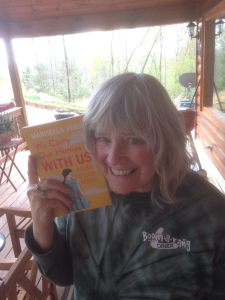 I am so proud of my friend and colleague, Marisella Veiga, on the publication of We Carry Our Homes with Us – A Cuban American Memoir. Yes, I do have a personal relationship with the author so perhaps my comments might be viewed as slanted. However, I can tell you her book is honest, raw, and triumphant. As someone who lived in the same town until I went away to college–thirty miles away–this book astounded me as I attempted to understand what it must have been like to move as much as the Veiga family did during Marisella’s formative years. Not only did they move, but they were ripped from their home only to become exiles in a foreign land where very few understood what it meant to be Cuban.
I am so proud of my friend and colleague, Marisella Veiga, on the publication of We Carry Our Homes with Us – A Cuban American Memoir. Yes, I do have a personal relationship with the author so perhaps my comments might be viewed as slanted. However, I can tell you her book is honest, raw, and triumphant. As someone who lived in the same town until I went away to college–thirty miles away–this book astounded me as I attempted to understand what it must have been like to move as much as the Veiga family did during Marisella’s formative years. Not only did they move, but they were ripped from their home only to become exiles in a foreign land where very few understood what it meant to be Cuban.
I’ve known Marisella for more than a decade, but I discovered I really didn’t know her heart and soul until I read her account of what it was like growing up as an exile from her homeland of Cuba. At three years old, she didn’t understand the ramifications of the plane ride from Havana to Miami with her mother and two brothers. Her father joined them later with only fourteen cents in his pocket and dim prospects for work in a city teeming with Cubans who’d escaped the Communist regime of Fidel Castro. Both of her parents were professionals: her mother was a podiatrist, and her father a respected accountant. With three young children and a fourth on the way, they were placed with a host family in Minnesota–so far from their culture that even a far cry couldn’t reach the shores of the island just ninety miles away from the United States. But her father would be able to find work there, maybe not at the same professional level as he enjoyed in Cuba, but work in his field nonetheless.
There are parts that are heartbreaking, such as the story of the little Marisella not having any friends in school until the fourth grade, sitting isolated in the classroom in a world of silence because she did not yet speak English. She also looked different from the other students, where most of them hailed from northern European bloodlines. However, her descriptions of growing up in the United States of the 1960s in a community give a nostalgic longing for a time of innocence no longer possible in the age of social media exposure. The children formed their own communities. And the other Cuban families that came in the same program as the Veigas to Minnesota formed yet another, providing comfort in such a different place from Cuba.
I found myself crying, laughing, and cringing at some of her brutally honest explorations of her life of exile in Minnesota. She writes in the very beginning that, “People learn to live in exile–no matter where one sets up housekeeping–by experiencing it. Exile is a state of being that continues for most Cubans who live outside their country if they have left for political, not economic, reasons. It ends when Cuba embraces democracy.”
This statement alone let me know that I was reading about something vastly different from my own experience as a citizen of the United States.
Even though the family settles in Minnesota, movement continues as the family grows in size and in finances. By the age of four, she’d lived in five different places, and the moves continued while living in Minnesota.
The writing of this book took tremendous effort as my friend dug into the past and her feelings surrounding her exile. Through her experience, she learned not to place too much importance on material objects, and she learned to adapt and welcome change as one thing remained constant:
A place is called a home, no matter where the dwelling is situated, for one reason: the sanctuary of home is carried within each person. The material manifestation–trailer, apartment, or mansion–is secondary.
Marisella interviewed many of the folks she knew from the Minnesota days to write this book, and when it released in April, she returned for a book signing. Members of her family’s host family came to see her as did friends she made in the last few years they stayed there. After Marisella completed fifth grade, the family returned to Miami where they remained. Marisella returned to Minnesota for college to the place where her exile began but also where so many parts of her personality were formed. The writing of this book brought her full circle.
This memoir, published by the Minnesota Historical Society Press, is an outstanding book that should be mandatory reading for all, especially those who find it difficult to embrace a culture different from their own. We Carry Out Homes With Us will open your heart and your mind.
Purchase Links
I had the pleasure of helping Marisella put together her Cuban Rice Classics cookbook several years ago. She’s a talented woman who does Cuban cooking demonstrations, speaks about her life of exile, and continues to write.
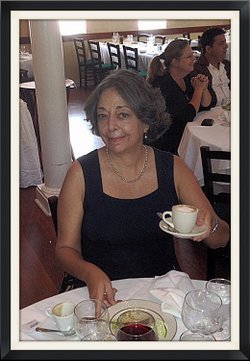 More about Marisella Veiga: Writer Marisella Veiga was born in Havana, Cuba. She was raised both in St. Paul, Minnesota, and Miami, Florida. Her writings have appeared in numerous magazines and newspapers, including the Washington Post, Poets & Writers and Art in America. In 2004, she was given the Evelyn La Pierre Award in Journalism by Empowered Women International. She is a nationally syndicated columnist with Hispanic Link News Service. Many of these are recorded on a spoken word CD, Square Watermelons: Ten Essays on Living with Two Cultures available from Eclipse Recording Studio in St. Augustine. Many of her short stories, one of which won The Pushcart Prize Special Mention in Fiction, are in literary anthologies. Veiga’s essays also appear in Hispanic Outlook in Higher Education and Our Town magazines. Besides teaching part-time at Flagler College in St. Augustine, Florida writing, she has been giving Cuban cooking demonstrations at various venues around Florida.
More about Marisella Veiga: Writer Marisella Veiga was born in Havana, Cuba. She was raised both in St. Paul, Minnesota, and Miami, Florida. Her writings have appeared in numerous magazines and newspapers, including the Washington Post, Poets & Writers and Art in America. In 2004, she was given the Evelyn La Pierre Award in Journalism by Empowered Women International. She is a nationally syndicated columnist with Hispanic Link News Service. Many of these are recorded on a spoken word CD, Square Watermelons: Ten Essays on Living with Two Cultures available from Eclipse Recording Studio in St. Augustine. Many of her short stories, one of which won The Pushcart Prize Special Mention in Fiction, are in literary anthologies. Veiga’s essays also appear in Hispanic Outlook in Higher Education and Our Town magazines. Besides teaching part-time at Flagler College in St. Augustine, Florida writing, she has been giving Cuban cooking demonstrations at various venues around Florida.







